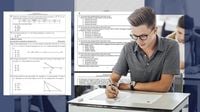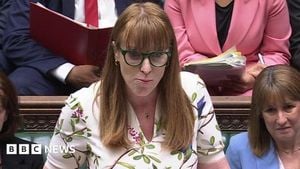As the National Evaluation for eighth-grade students approaches, educators are raising concerns about the emphasis on core subjects and the impact on students' overall learning experience. Claudia Puzdrea, a chemistry teacher at a middle school in Bucharest, expressed her worries during the "Educație la putere" show on May 6, 2025. She noted that eighth graders are primarily focused on Romanian and mathematics, which leads to other subjects suffering as a result.
Puzdrea articulated her frustration, stating, "Oricât m-aș da peste cap și oricâte mijloace digitale aș folosi și oricât m-aș coborî la nivelul lor, totuși, ei se canalizează în clasele a VIII-a strict pe română și matematică și atunci celelalte discipline suferă puțin." This translates to, "No matter how much I try and how many digital tools I use, they focus strictly on Romanian and math, and other subjects suffer as a result." She further emphasized the diminishing interdisciplinary approach that was once anticipated in the education law.
According to Puzdrea, the topics for the National Evaluation do not encourage creative expression or critical thinking. She commented, "Nu prea oferă posibilitatea exprimării creativ. Nu poți să dovedești prin subiectele care se dau gândirea critică," which means, "They do not provide the opportunity for creative expression. You cannot demonstrate critical thinking through the given topics." This sentiment reflects a broader concern among educators regarding the current structure of the evaluation, which many believe stifles student creativity.
Moreover, Puzdrea pointed out a noticeable drop in student interest in exact sciences, particularly mathematics. She stated, "Dacă vorbim de rezultatele la simularea examenului de Evaluare Națională de clasa a VIII-a de anul acesta cred că au fost ceva mai mici decât anul trecut," meaning, "If we talk about the results of this year's simulation exam for the National Evaluation, I believe they were somewhat lower than last year." This decline, she suggests, is linked to the nature of the exam content, which she finds increasingly simpler compared to previous years.
The National Evaluation, a crucial exam for students wishing to enter high school, will take place from June 23 to June 27, 2025. The Ministry of Education has released sample questions and answer keys to help students prepare. The exams will cover Romanian Language and Literature, Mathematics, and the Mother Tongue.
Enrollment for the National Evaluation is set to occur between June 10 and June 13, 2025, with the last day of classes for eighth graders falling on June 13. The Romanian Language and Literature exam will kick off the evaluation process on June 23, followed by the Mathematics exam on June 25, and the Mother Tongue exam on June 27.
The mathematics exam will consist of three main sections: multiple-choice exercises, short answer questions, and complex problems. An example of a multiple-choice question includes calculating the result of (40 + 2 x 5) : 5, with the correct answer being 10. Additionally, a problem involving a right triangle ABC, where angle ACB equals 60 degrees and the bisector CM measures 8 cm, requires students to determine the length of side AB, which is 12 cm.
Students will also encounter complex problems, such as demonstrating that f(3) x f(2025) = 0 for the function f(x) = 2x - 6. The working time for the mathematics exam is set at 120 minutes, with students receiving 10 points automatically for their participation.
The Romanian Language and Literature exam will be divided into two main sections: the first requiring students to read a passage from Ion Creangă's "Amintiri din copilărie" (Childhood Memories) and a text about the Erasmus Program, followed by a composition task.
Initial results from the National Evaluation will be released on July 3, 2025, allowing students to view their written papers and file appeals if necessary. Appeals can be submitted between July 4 and July 5, 2025, and will be resolved from July 6 to July 9, with final results announced on July 10, 2025.
As the exam dates draw near, educators like Puzdrea continue to advocate for a more balanced approach to education, where creativity and critical thinking are prioritized alongside core subjects. The current structure of the National Evaluation, while essential for high school admission, raises questions about its effectiveness in fostering a well-rounded education for students.
In summary, the upcoming National Evaluation presents not only a pivotal moment for eighth-grade students but also a reflection of the ongoing challenges within the Romanian education system. With educators voicing their concerns, it remains to be seen how the Ministry of Education will address these issues to enhance the learning experience for future generations.




